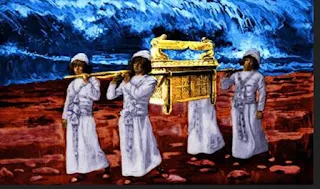The
LORD spoke to Manasseh and his people, but they paid no attention. So the LORD
brought against them the army commanders of the king of Assyria, who took
Manasseh prisoner, put a hook in his nose, bound him with bronze shackles and
took him to Babylon. 2nd Chronicles 33:10-11 (NIV)
King
Hezikiah had been a good king during his rule over Judah, a righteous man who
insisted the Jews follow the Law of the LORD. God blessed and prospered his
righteous reign. His son and kingly heir, Manasseh, came to the throne at 12
years old at the death of his father.
Manasseh was
given to a defiant nature and rebelled against God and his father’s spiritual
leadership and values. His rebellious streak lasted years and he did great evil
in the eyes of the LORD, undoing everything good his father had done. He led
the nation into the most egregious apostasies from witchcraft, sorcery, and setting
up an idol in the temple, to sacrificing by fire his children to a heathen god
(2nd Kings 21:7, 2nd Chronicles 33:6). He brought
unmatched defilement to the kingdom of Judah.
Even though God
in His grace allowed Manasseh’s rebellion to go on for a time even when His
warnings were ignored, the floodwaters of his choices finally closed over his
head. The LORD allowed the king of Assyria to conquer him, and the once grand king was taken prisoner and led into captivity like an ox, with a nose-chain, and bound by
bronze shackles (2nd Chron. 33:11).
While a
story like this can usually end in justification, accusations, and bitterness
toward God and others, this story has a positive ending. Solomon’s wisdom of raising
up a young child in the way they should go in the Lord is spot on (Prov. 22:6).
It is altogether possible the memory and teaching of Manasseh’s godly father was the major catalyst to his later repentance.
For parents who
have children who have moved away from what they were first taught in Christ,
may this be an encouragement. If God could touch the heart of a Manasseh, He
certainly can touch the heart of any wayward child. God says of His power and
will, “so is my word that goes out from my mouth: It will not return to
me empty, but will accomplish what I desire and achieve the purpose for which I
sent it” (Is. 55:11).
Manasseh
cried out to the LORD in true repentance, not just because he wanted to be
brought out of his bondage but because he got honest with God in wanting to serve
and honor Him. It was a jailhouse conversion to be sure, but there have been
many men and women who recognized and embraced the light they had been running
from when it broke upon them in a prison cell. God not only forgave Manasseh
but restored his throne and rule of Judah’s kingdom to him.
I am not
teaching that God restores every penitent soul back to their former lifestyles
and privileges. While that can happen, it is not always the case. We are dependent
on God’s grace and plan for our lives. Whatever prison and brokenness He brings
anyone out of, He will craft their life to His own purposes, designs, and glory.
That is where the greatest blessing for anyone ultimately lies.
I once had a
little maple tree that had been broken off close to the ground in a
thunderstorm. I at first thought it was broken beyond saving and I was going to
dig it up, but decided to wait and see what would happen. I pruned it and within
three weeks it had amazingly sprouted new growth!
That was
over twelve years ago, and at this writing that tree is around 20’ tall, healthy,
and verdant. One would never know that at one time it had been so utterly
broken and looked beyond saving. That life is not what it once was, but it is beautiful in its recovery now.
So will we be in Christ’s care, no matter the pasts prison we have done time in.
Manasseh certainly did
make a mess of things, but in His brokenness and contrite heart God in His
grace picked up the pieces (Psalm 51:17). Manasseh did not need to clean
himself up, before God would have him back, he just needed to come to Him as he
was. When the Master Arborist finished pruning his life, He cleaned up the mess.
A broken tree began to grow and budded into a life of beauty and strength that
blessed a nation through which the Messiah would come. When life lets us down, that
same Messiah, Jesus Christ, will lift us up, every time.
Maranatha,
Ken







